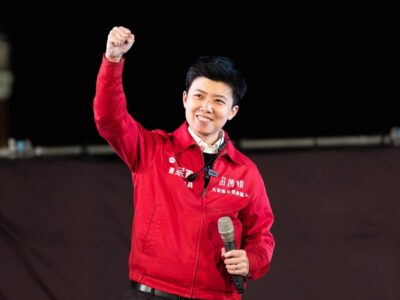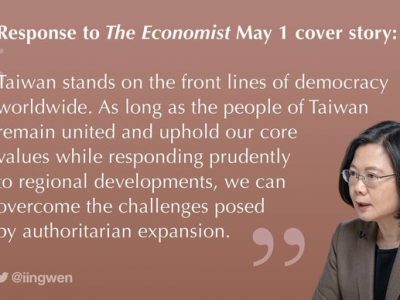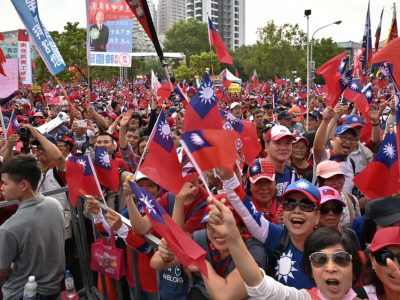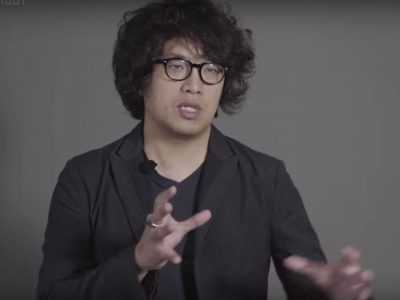
Image via Bloomberg Television YouTube screenshot.
Taiwan held presidential and parliamentary elections on January 13 that will determine its political and security future, given escalating threats from Beijing, which continues to insist that the reunification of the island with the People’s Republic of China (PRC) remains its main historical mission.
China has positioned the Taiwan election as a choice between war and peace to dissuade Taiwanese voters from giving their votes to William Lai Ching-te, the presidential candidate of the ruling Democratic Progressive Party (DDP), which is considered a pro-Taiwan independent party in the eye of Beijing.
The US is watching the election closely as Taiwan is its close ally in the Asia Pacific. In response to the highly intense cross-strait relations, Joe Biden’s government has sought to resume, days ahead of the Taiwan elections, both talking with the Chinese government and military to manage the crisis. Just days ahead of the Taiwan election, China agreed to resume military communication with the US.
The election is also being closely monitored by neighboring countries such as the Philippines, Japan, and South Korea given their own complicated relations with China and dependency on the US for military security.
The history of relations between the Republic of China (ROC) and the PRC is complex and contains fine nuances, that frequently center around the terms used to describe each — terms that often diverge in Taipei and Beijing. Republican China’s civil war ended in 1949 when supporters of the Kuomintang (KMT) party that fought the Chinese Communist Party (CCP) fled to the island of Taiwan, which had only recently, in 1945, ended fifty years of Japanese colonial rule. The former KMT declared themselves the new masters of Taiwan as the legal representative of China worldwide, keeping a seat at the United Nations, as one of the founding members in 1945.
For over two decades, most of the world did not establish diplomatic relations with Beijing, sticking to the ROC government in Taiwan. But things changed dramatically in 1971 after the US decided to switch its primary diplomatic relationship to the PRC, a move that was rapidly adopted by most countries around the world.
This sparked one of the most important disagreements between Taipei and Beijing: the 1971 2758 UN resolution says that the ROC government in Taiwan no longer represents China, which is now legally represented by the PRC, which thus also gets a seat at the UN Security Council. The resolution does not mention anything about the future of Taiwan at the UN and this is where Taipei and Beijing diverge the most: for the PRC, this is interpreted as a ban on any Taiwan representation at the UN, while Taiwan contests this given that the resolution does not include such language.
This issue is at the heart of the current political debate between the ruling DPP party, which has made the issue of non-recognition of Taiwan the focus point of its policy in the past eight years, and the KMT party that advocates for close economic ties with Beijing as its main policy. One of the dominating debates in Taiwan is the fact that rising living costs and low job prospects make life particularly challenging for younger Taiwanese. This issue has been instrumentalized by a third party, the Taiwan People’s Party (TPP) led by Ko Wen-ji, thus disrupting the traditional blue (KMT)-green (DPP) two-party only political landscape.
According to major election polls, while William Lai will most likely be the new president, the DPP will probably lose the legislative majority in the upcoming elections, which implies there will be more space for negotiating policies with China in the legislature as both KMT and TPP are more China-friendly. The Taiwanese choice between war and peace is not that absolute.
Stories about Taiwan: Caught between war and peace
The legacy of the Sunflower Movement: Taiwan’s emerging three-party politics
"...there is no unifying force in Taiwan that represents the values generated by the Sunflower Movement, so people can only vote for the DPP and the newly emerged TPP."
A snapshot of Taiwan's Sunflower movement ten years later
In 2014, Taiwan experienced an unprecedented youth protest, known as the Sunflower Movement, that altered local politics and relations with China. What is its legacy ten years later?
‘I am Taiwanese now’: Hongkongers who have moved to the democratic island cherish their right to vote
A Hongkonger who migrated to Taiwan after the 2019 anti-China extradition protest said: "I am Taiwanese now, and I hope Taiwan will improve — although I haven't abandoned my Hongkonger identity."
Taiwan election 2024: Ruling DPP fails to retain legislative majority after winning presidential race
Taiwan’s ruling Democratic Progressive Party (DPP) has failed to retain a majority in the Legislative Yuan after winning the presidential election. Opposition parties may form a coalition and take control of the chamber.
Taiwan election 2024: The three presidential candidates’ views about relations with China
Taiwan’s presidential election on January 13 will shape the future of the self-ruled democratic island, from relations with China and the US to domestic issues that affect 23 million people.
Beijing dismisses election interference allegations amid aircraft and balloon intrusion
Ahead of the Taiwan's presidential and legislative elections, many reports have emerged alleging Beijing is attempting to swing the voters' choice.
Decoding eight years of Taiwan's presidency by Tsai Ing-wen: Interview with French journalist Arnaud Vaulerin
"During this period, this democracy of 23.5 million inhabitants has positioned itself in the international arena. There will be a before, and an after Tsai Ing-wen."
Why are Taiwanese politics and society still male dominated? Interview with scholar Jhang JhuCin
As Taiwan is gearing for major elections in January 2024, Global Voices talked to scholar Jhang JhuCin about gender relations in Taiwan in politics and society at large.
‘New Bloom': A rare leftist media voice in Taiwan
As Taiwan prepares for presidential and legislative elections, Global Voices spoke to one of the few leftist media operating outside of the Kuomintang/Democratic Progressive Party dichotomy that dominates local media.
Taiwanese citizens take the nation's defense into their own hands: Interview with scholar Wen Liu
For people in Taiwan living under regular military threats from China, Russia's full-scale invasion of Ukraine has prompted queries about the Taiwanese military forces' own readiness and resilience.
Taiwan's official diplomatic relations: A hard game to play in the face of China's obstruction
Taiwan, which has diplomatic relations with 13 countries, multiplies other forms of public diplomacy to maintain engagement and support with many countries, particularly in Central Europe.
Taiwanese ex-president Ma Ying-jeou’s visit to China sparks speculation
It's clear that the KMT is eager to reestablish relations with China without upsetting Taiwan’s autonomy, yet Ma’s visit will be politically difficult as few are likely to embrace him.
After US House Speaker Pelosi’s visit, fake news flooded Taiwan's social media
The fake news circulated in Taiwan days surrounding Pelosi's visit mainly aimed at insulting Pelosi, showing off China's military power in the drills, belittling Taiwan's status.
Is China attempting to normalize military drills around Taiwan?
China may attempt to normalize its military drills in the Taiwan Strait. What does this mean for the future of Taiwan and regional relations?
Taiwan, ‘the most dangerous place on Earth'? Not according to Taiwanese.
This week's cover story by the British magazine The Economist labeled Taiwan "the most dangerous place on Earth," eliciting a lot of reaction on Taiwanese Twitter.
Most Taiwanese unfazed by former president's fearmongering on war with China
Speaking at a conference on August 10, former Taiwanese president Ma Ying-jeou said that, once China attacks Taiwan, “the first battle will be the last."
Political beliefs divide generations and strain family ties in Taiwan
While the outcome of the Taiwan 2020 presidential election is settled, generational conflicts continue.
How ‘fake news’ and disinformation were spread in the run-up to Taiwan's presidential elections
Puma Shen, director of DoubleThink Labs, shares his observations on the ways in which fake news and disinformation were disseminated prior to Taiwan's January 11, 2020 presidential elections.
Is Taiwan an unrecognized country?
"While today the international community is happy to maintain the current status-quo when dealing separately with Taiwan and China, certain political forces in both places are advocating for a change."


_13535594173-400x300.jpg)

















